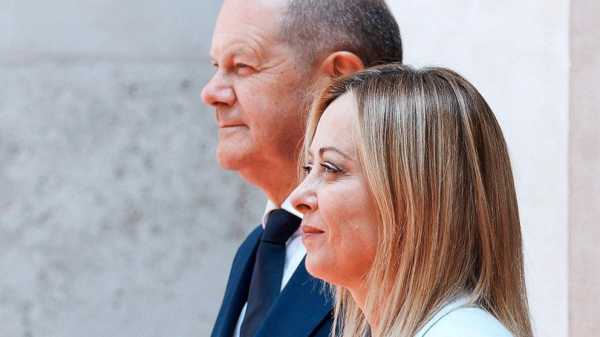
ROME — The leaders of Italy and the Netherlands along with the EU Commission president travel to Tunisia on Sunday with a packet of initiatives to help create security in Tunisia, easing the way for a possible international bailout, Italian Premier Giorgia Meloni told reporters Thursday.
"Tunisia is a priority, because destabilization in Tunisia would have serious repercussions on the stability of all Northern Africa, and those repercussions inevitably arrive here,'' Meloni said during a press conference with German Chancellor Olaf Scholz.
The European Commission said talks would center on making progress on an EU-Tunisia agreement focused on the economy, energy and migration.
Tunisia has seen growing numbers of African migrants arriving from neighboring Libya, and has appealed for economic help. The Organization for Economic Cooperation and Development says Tunisia is experiencing its worst crisis in a generation, with inflation hovering around 11% and food increasingly scarce.
The Tunisian government was negotiating with the International Monetary Fund for a $1.9 billion loan agreement, but talks stalled last year amid Tunisia's political tensions. The country’s budget deficit was aggravated by the COVID-19 pandemic and fallout from Russia’s war in Ukraine.
In 2021, President Kais Saied disbanded parliament and had the constitution rewritten to give more power to the presidency and less to the legislature. Elections in January for a new parliament were boycotted by many Tunisians: turnout only reached 11.3%, casting doubt on the assembly's legitimacy.
Meloni said managing migrant flows was a priority, noting that instability created "a domino of other problems for Italy, and also for Europe as a whole."
She did not specify measures, but said the presence of EU Commission President Ursula von der Leyen along with Dutch Prime Minister Mark Rutte in the delegation “signals a very important desire."
Meloni was already in Tunisia earlier this week: she met with President Kais Saied on Tuesday to lay the groundwork for an agreement with the EU, which she said she hoped would pave the way for a bailout with the IMF.
Saied has resisted some of the painful reforms the IMF wants in return for the loan agreement. They include shrinking the public administration sector, one of the largest in the world, which eats up about a third of the state budget.
“I don’t want to get ahead of myself I think we can reach a solution to this problem that we are all working on.’’ Meloni said.
Sourse: abcnews.go.com






